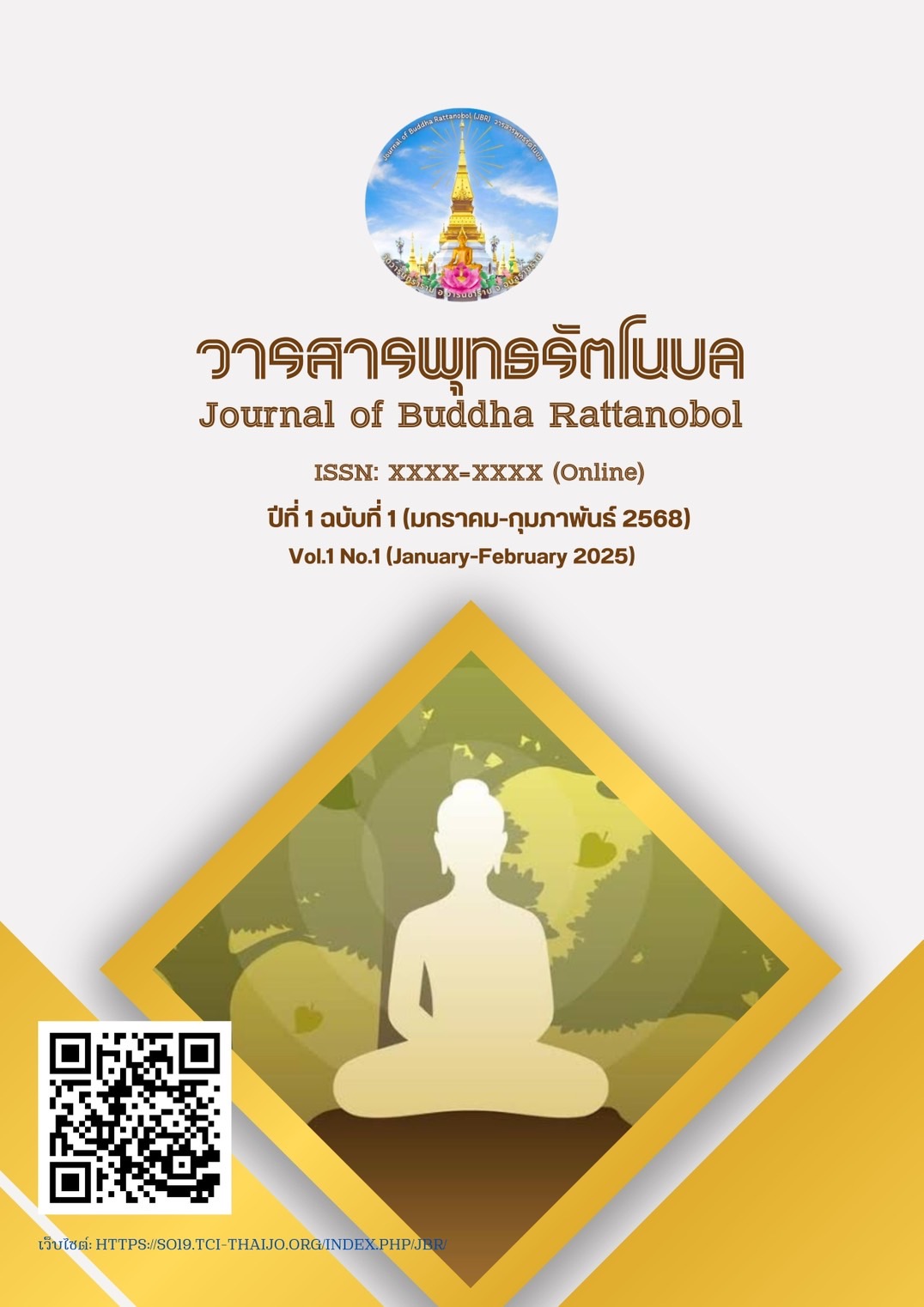Developing Quality of Life through the Integration of the Sufficiency Economy Philosophy and the Five Precepts
Main Article Content
Abstract
This academic article aims to study and present an approach to improving the quality of life by integrating the Sufficiency Economy Philosophy with the Five Precepts, two essential concepts that promote balanced and sustainable living. The Sufficiency Economy Philosophy, bestowed by His Majesty King Rama IX to the Thai people, emphasizes living with moderation, reason, and self-immunity against various factors at both the individual and societal levels. The application of the Five Precepts, which include refraining from killing, stealing, sexual misconduct, lying, and intoxication, serves as a moral and ethical framework for living. These principles help individuals and society maintain long-term peace and ethical conduct. In the present day, complex economic and social problems have contributed to the deterioration of the quality of life for many Thais. Integrating the Sufficiency Economy and the Five Precepts enables individuals to live ethically, reducing excessive consumption and resource utilization. Furthermore, the integration of these two principles fosters sustainable happiness in both individual and family life. This research highlights the interconnection between the Five Precepts and the Sufficiency Economy as powerful tools for enhancing the quality of life. These principles not only foster moral values but also contribute to economic and social stability. The study concludes that combining these two concepts has the potential to create balance in both mental and economic aspects for individuals and communities in Thai society, particularly in an era of rapid change and future uncertainties.
Article Details

This work is licensed under a Creative Commons Attribution-NonCommercial-NoDerivatives 4.0 International License.
References
กนกอร บุญมี. (2560). เศรษฐกิจพอเพียงกับการบริหารธุรกิจอย่างยั่งยืน. วารสารการบริหารจัดการ มหาวิทยาลัยภาคตะวันออกเฉียงเหนือ. 10(2), 55-88.
เกรียงศักดิ์ เจริญวงศ์ศักดิ์. (2546). การคิดเชิงวิเคราะห์ (พิมพ์ครั้งที่ 3). กรุงเทพมหานคร: ซัคเซสมีเดีย.
ติน ปรัชญพฤทธิ์. (2555). ศัพท์รัฐประศาสนศาสตร์ (พิมพ์ครั้งที่ 11). กรุงเทพมหานคร: บริษัท วี. พริ้นท์.
พรธิดา วิเศษศิลปานนท์ และคณะ. (2556). โครงการติดตามการเข้าถึงสิทธิของคนพิการและการพัฒนารูปแบบระบบสวัสดิการที่ส่งเสริมการเข้าถึงสิทธิของคนพิการ. กรุงเทพมหานคร: กรมส่งเสริมและพัฒนาคุณภาพชีวิตคนพิการ.
พระครูทักษิณานุกิจ (พิทยา ปริญญาโณ). (2564). การพัฒนาศีล 5 ต้นแบบเพื่อส่งเสริมสันติสุขในชุมชน. วารสารบัณฑิตวิทยาลัย มหาวิทยาลัยสงฆ์.
พระครูวินัยธรสัญชัย ญาณวีโร. (2561). การนำศีล 5 ไปประยุกต์ใช้ในชีวิตประจำวันของนักศึกษา. วารสารปรัชญาปริทรรศน์. 23(1), 37-56.
พระธรรมปิฎก (ป.อ. ปยุตฺโต). (2538). พุทธธรรม ฉบับปรับปรุงและขยายความ. กรุงเทพมหานคร: มหาจุฬาลงกรณราชวิทยาลัย.
พระมหาณรงค์ จิตฺตโสภณ. (2532). พระพุทธศาสนากับการพัฒนา. กรุงเทพมหานคร: โรงพิมพ์มหาจุฬาลงกรณราชวิทยาลัย.
พระมหาภิรัฐกร อังสุมาลี. (2564). แนวทางการปฏิบัติสู่ความเป็นอริยะที่ปรากฏในภยสูตร. วารสารโพธิศาสตร์ปริทรรศน์.1(1), 26-36.
พระมหาสันติราษฎร์ ฌานสันติ. (2562). การประยุกต์หลักศีล 5 เพื่อพัฒนาพฤติกรรมของชาวบ้านชุมชนบ้านใหม่พัฒนา. วารสารธาตุพนมปริทรรศน์.
พระมหาหรรษา ธมฺมหาโส และคณะ. (2555). คู่มือปฏิบัติงานการบูรณาการพันธกิจ. พระนครศรีอยุธยา: มหาวิทยาลัยมหาจุฬาลงกรณราชวิทยาลัย.
พระมหาอินทร์วงค์ อิสฺสรภาณี และคณะ. (2562). การศึกษากระบวนการป้องกันและแก้ไขการฆ่าตัวตายตามหลักพระพุทธศาสนา. MCU Journal. 5(2), 15-25.
มหาจุฬาลงกรณราชวิทยาลัย. (2539). พระไตรปิฎกภาษาไทยฉบับมหาจุฬาลงกรณราชวิทยาลัย. กรุงเทพมหานคร: โรงพิมพ์มหาจุฬาลงกรณราชวิทยาลัย.
สมพร เทพสิทธา. (2536). การพัฒนาแบบยั่งยืน. กรุงเทพมหานคร: โรงพิมพ์สมชายการพิมพ์.
สัญญา สัญญาวิวัฒน์. (2533). พุทธสังคมวิทยา. กรุงเทพมหานคร: โรงพิมพ์เจ้าพระยาการพิมพ์.
สาโรช บัวศรี. (2521). ความรู้สำหรับครูเรื่องบูรณาการ. กรุงเทพมหานคร: รุ่งเรืองสาสน์การพิมพ์.
สำนักงานปลัดกระทรวงศึกษาธิการ. (2550). แนวทางการนำปรัชญาของเศรษฐกิจพอเพียงไปจัดการศึกษาในสถานศึกษา. กรุงเทพมหานคร: โรงพิมพ์กระทรวงศึกษาธิการ.
พระสุรเชษฐ์ อิทฺธิเตโช (ไชยรา). (2564). การประยุกต์ใช้หลักศีล 5 ไปใช้ในในการพัฒนาคุณภาพชีวิตประจำวันของประชาชนบ้านส้มป่อยค่ายเมืองแสน ตำบลนาด่าน อำเภอสุวรรณคูหา จังหวัดหนองบัวลำภู. วารสารปัญญาปณิธาน.6(1), 215-228.
เสกสรรค์ สนวา. (2017). การประยุกต์ปรัชญาของเศรษฐกิจพอเพียงกับการพัฒนาชุมชนในศตวรรษที่ 21. วารสารมนุษยศาสตร์และสังคมศาสตร์ มหาวิทยาลัยราชภัฏสกลนคร.
Chaichana, S. (2018). Implementing the Philosophy of Sufficiency Economy to Improve People's Quality of Life.Ramkhamhaeng Journal of Public Administration.
Sanu Mahatthanadull. (2018). THE FIVE PRECEPTS: CRITERIA AND THE PROMOTION OF INDIVIDUAL AND SOCIAL PEACE. Journal of MCU Social Science Review. 7(2), 55-65.
Phrakhru Udomchandavan (Uttamo). (2018). The Buddhist Integrated Life Quality Development of People in Buriram Province. Mahachula Academic Journal. 5(2), 217-230.


